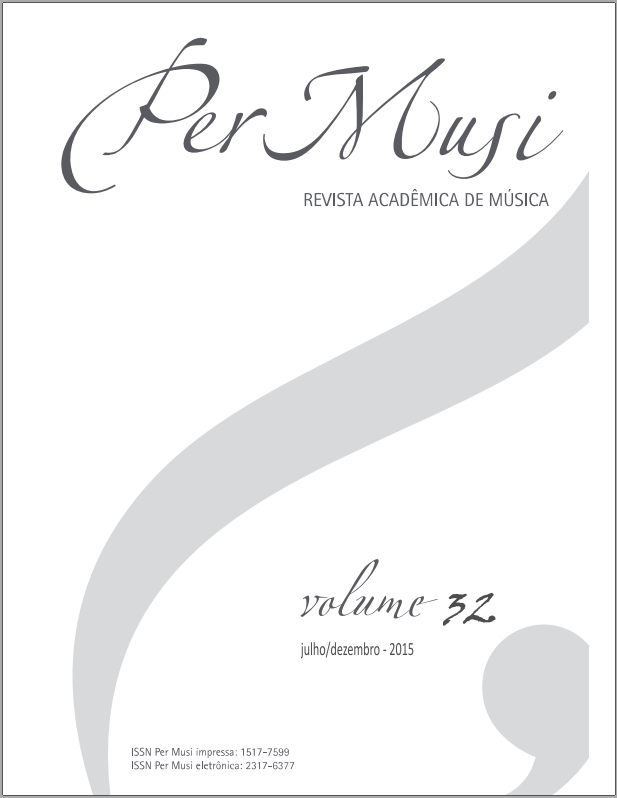Imagens do Brasil na música erudita do século XX
reflexões conceituais sobre identidades culturais brasileiras
Palavras-chave:
Identidade cultural, Cultura brasileira, Música contemporânea, Música brasileiraResumo
O presente artigo trata do processo de construção de imagens na elaboração da identidade cultural expressa na música erudita brasileira, durante o século XX. Para isso, buscou-se apontar algumas questões conceituais, relacionadas à narrativa, às criações de imagens e à identidade cultural, que são fundamentais para o entendimento da cultura brasileira como um sistema de representações culturais. Nesse sentido, tentamos traçar um quadro referencial (SALLES, 2005; KATER, 2001; CONTIER, 1978) de como se criaram algumas relações significativas entre determinados materiais musicais e elementos da cultura brasileira. Assim, partimos de reflexões em torno das ideias de sujeito, identidade, pertencimento, cultura e identidade nacional (HALL, 2006). Em seguida, procuramos entender o processo de construção das narrativas e imagens em torno de uma identidade cultural nacional, para, só então, compreender a relatividade das autoimagens coletivas (REZENDE, 2009; ORTIZ, 1994) que se fizeram presentes na música erudita brasileira neste período.
Referências
CANÇADO, T.L. (2000). “O fator atrasado na música brasileira: evolução, características e interpretação”. Per Musi. Belo Horizonte: UFMG. n.2, p.5-14.
CONTIER, A.D. (1978). Música e Ideologia no Brasil. São Paulo: Novas Metas.
DOTTORI, M. (2005). “As ideias e a música: influências europeias na música brasileira”. Anais do colóquio Brasil musical. Paraná: De Artes - UFPR.
FREITAG, L.V. (1985). Momentos de Música Brasileira. São Paulo: Nobel.
HALL, S. (2006). A identidade cultural na pós-modernidade. 11ª ed. Rio de Janeiro: DP&A, 2006.
KATER, C.E. (2001). Música Viva e H. J. Koellreutter: movimentos em direção à modernidade. São Paulo: Musa Editora; Atravez.
MARTINEZ, J.L. (2006). “Brasilidade e Semiose Musical”. Revista Opus. Campinas: ANPPOM. nº12, p.114-131.
NEGWER, M. (2009). Villa-Lobos: o florescimento da música brasileira. São Paulo: Martins Fontes.
NEVES, J.M. (1981). Música Contemporânea Brasileira. São Paulo: Ricordi Brasileira.
ORTIZ, R. (1994). Cultura Brasileira e Identidade Nacional. 4ª ed. São Paulo: Brasiliense.
REZENDE, C. (2009). Retratos do estrangeiro: identidade brasileira, subjetividade e emoção. Rio de Janeiro: FGV.
RIBEIRO, D. (1992). A Fundação do Brasil: testemunhos 1500-1700. Petrópolis: Vozes.
SALLES, P.T. (2005). Aberturas e Impasses: o pós-modernismo na música e seus reflexos no Brasil (1970 – 1980). São Paulo: UNESP.
SANTOS, E.P. (2006). “Uma Viagem até a Brasilidade: romance pós-moderno e pós-colonial e romance indianista brasileiro”. Revista Letras de Hoje. Porto Alegre. v.41, n.3, p.185-200.
VIANNA, H. (2010). O Mistério do Samba. 7ª ed. Rio de Janeiro: Zahar: UFRJ.
WISNIK, J.M. (2004). “Getúlio da Paixão Cearense: Villa-Lobos e o Estado Novo”. In: Música: o nacional e popular na cultura brasileira. Reimp. 2º ed. São Paulo: Brasiliense.
Downloads
Publicado
Edição
Seção
Licença
Copyright (c) 2015 Per Musi

Este trabalho está licenciado sob uma licença Creative Commons Attribution 4.0 International License.

Exceto onde está indicado, o conteúdo neste site está sob uma Licença Creative Commons - Atribuição 4.0 Internacional.












